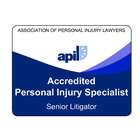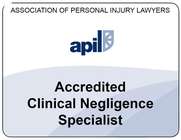A Portsmouth family’s distress demonstrates the dangers of delayed sepsis diagnosis in children

The dangers associated with delayed diagnosis and treatment of sepsis in children has once again been vividly highlighted by the distressing case of a young girl in a Portsmouth family.
In November 2017, the family endured a horrific three-day vigil during which the condition of their 19-month old daughter, Lilly Reynolds, deteriorated to a critical state as the debilitating effects of sepsis took hold.
So concerned are Lilly’s parents by the ordeal that they have asked Janine Collier at Tees to look into their case for them. Janine, who is an Executive Partner and Head of the Medical Negligence Department at Tees, explains: “Lilly had a number of ‘red flag’ symptoms and yet these appear to have been either ignored or overlooked – a high temperature, a confluent rash, a rapid heart rate and respiratory rate, low oxygen saturations and she was groaning. She had not eaten for 48 hours, her urine output was reduced. It is hard to understand why the Trust discharged a very sick baby, clearly in need of the sepsis protocol. Even after she was re-admitted, it took some hours for the Hospital to realise that she was septic and start treatment.
“As a result of the failure to consider sepsis and initiate the sepsis protocol, Lilly’s condition became life threatening and her family first feared that Lilly may not survive and then were told that she may lose her foot. Although Lilly has recovered from the sepsis, she has been left with residual disability and the prognosis is uncertain.”
Lilly, a fit and healthy child, with no prior medical history, initially developed a fever, was breathing slightly erratically and not drinking much. Her parents were naturally concerned and called 111 for advice at around lunchtime on Saturday 4 November. They were advised to attend an out-of-hours surgery, which they duly did. The GP’s diagnosis was that Lilly had an upper respiratory tract infection and advised that she be given paracetamol and ibuprofen and that, if Lilly’s condition worsened, her parents should seek further medical advice.
While the next day saw some improvement, by the following morning her condition had again deteriorated. She had a rash behind her ears, on her torso and on her head, had become red on her face, was extremely lethargic, would not take fluids and her nappies were almost dry. Her parents therefore took Lilly to the St Mary’s Hospital Walk-in Centre in Milton, Portsmouth where they were told she had tonsillitis and would need antibiotics. However, the doctor was sufficiently concerned about Lilly’s condition to seek advice from Portsmouth’s Queen Alexandra Hospital (QAH) who requested Lilly attend to be checked over.
Lilly was immediately taken to QAH where the consultant recommended not taking the antibiotics that St Mary’s had prescribed as, in his opinion, Lilly had a viral infection and antibiotics would therefore not help. By the evening, Lilly had perked up a bit and was discharged with a 72-hour open access in case her condition deteriorated.
During the course of the next 24 hours, Lilly’s condition did worsen and her parents returned to QAH the following evening. After taking initial observations, nursing staff took Lilly to a ward area where she was left in her pushchair clearly in distress, wincing and screaming whenever either of her parents tried to comfort her. During a seven and a half hour hospital ordeal there was little communication from doctors or nursing staff as Lilly’s condition deteriorated. At around 2am, a doctor gave her a difflam spray in the hope this would numb her throat and enable her to drink and, after she did manage to take a few sips, discharged her half an hour later, saying there was nothing they could do at this time of night and that Lilly would be better off sleeping in her own bed.
After returning home, Lilly didn’t sleep for long and woke at around 7am. During the morning her parents gave her a combination of Calpol, ibuprofen and the difflam spray, and tried to get her to drink some milk. However, with Lilly still refusing fluids and her nappies dry, they returned at midday to the Children's Assessment Unit at QAH where she was taken to a four-bed ward and checked intermittently.
By six o’clock Lilly’s lips began to turn blue and her oxygen levels plummeted. At this point, Lilly was rushed into the resus room and intensive care unit staff arrived, asked for a chest x-ray, commenced broad spectrum antibiotics and requested that Lilly be monitored for the next half an hour for any changes. The x-ray was sent to a specialist at Southampton General Hospital and revealed pneumonia along with a substantial build-up of fluids on the lungs.
The specialist advised to commence antibiotics, sedate Lilly and transfer her to SGH immediately. Lilly had to have a tube put down her throat and an arterial line placed in her left foot before departing QAH. A team of ten medical staff were waiting for Lilly at Southampton and, on arrival, her parents were told that their daughter was about to lose her leg as the arterial line had cut the blood supply to her foot.
Lilly was ultimately diagnosed with sepsis and pneumonia and had 650ml of fluid drained from her lungs.
Lilly’s mother Danielle Barter commented: “The whole experience was extremely frightening and we wouldn’t want any parents to be put through a similar experience. Fortunately, Lilly has made a good recovery from the pneumonia and sepsis, although she is still suffering from her ordeal and the prognosis for her foot and leg is still unknown.”
Janine Collier again: “In the UK, more people die from sepsis than breast, bowel and prostate cancer put together. Early diagnosis and treatment not only saves lives but maximises the chances of a full recovery with no lasting problems. Because of this, NICE and the Sepsis Trust have issued clear Guidelines to help healthcare practitioners recognise where a patient is at risk of sepsis and how these patients should be cared for. We will be working closely with the family to review the facts in this tragic case."
Free, confidential advice on medical negligence
Call for a FREE initial consultation on 0800 013 1165
Alternatively, come in for a free, confidential, no obligation chat, or fill out our enquiry form and we will let you know how we can help. We can also visit you at your home if you wish.
Our medical negligence lawyers are based in:
- Cambridgeshire: Cambridge
- Essex: Brentwood, Chelmsford and Saffron Walden
- Hertfordshire: Bishop's Stortford & Royston
But we can help you wherever you are in England and Wales.
Chat to the Author, Janine Collier
Executive Partner, Medical Negligence, Cambridge office
Meet Janine
- Areas of expertise
- Accreditations
- Testimonials
Legal 500 UK 2023
'Janine Collier has an amazing reputation and quite rightly, she very quickly spotted something that wasn’t the main focus of the case but is able to zoom out and look at everything that’s going on and spot things others wouldn’t spot. You can tell she really cares and is a very dedicated person who just wants to help. The team are all caring and efficient'
A
Cambridge
'A heartfelt thank you for all you have done in preparation for and during the settlement meeting, as well as for your unfailing support along the way, in and out of hours. It is undoubtedly due to your high professionalism if the outcome today has exceeded all expectations; it will be a huge help for us going forward and we will be forever grateful'
Chambers & Partners 2022
Cambridge
'Janine Collier is renowned for her handling of delay in diagnosis, obstetric injury and surgical negligence claims. She is at the top of her game and knows clinical negligence inside and out'
Susan Hickman
Cambridge
'We consider ourselves fortunate to have been recommended to Tees by the solicitor we initially approached. We did not realise it until the case was well established that the level of professional care we were receiving was exceptional and that the experience of the individuals and the contacts they have to assist in a very complex case was the best available. We are grateful that we received a satisfactory settlement as a result of their efforts under difficult circumstances and dealing with defendants that were obstructive and disorganised. By far the greatest benefit for us however is the fact that the victim, with assistance from highly skilled experts that we would not have known about otherwise, learned to walk short distances when all other medical opinion did not consider this possible. This was their greatest achievement which is well beyond the service we expected'
Legal 500 UK 2021
"Janine Collier, head of department, is a perspicacious and very able lawyer, certainly one of the best in the region and beyond, who believes in her team and in the work she does. A genuinely nice person who sees it as her clients’ right and her duty to achieve the best possible outcome for them. Janine delivers this time after time. She is an extremely intelligent and intuitive lawyer who has a genuine understanding of the difficulties and fears clients experience when living with an avoidable injury."
Legal 500 UK 2021
"Janine Collier is a really good solicitor – she really understands the medicine in clin neg cases and works well with the team, the clients and the experts to get excellent results in difficult cases."
Legal 500 UK 2021
"Janine Collier is exceptionally good at analysis, organisation and strategy."
Legal 500 UK 2021
"Janine Collier is a really good solicitor, she really understands the medicine in clinical negligence cases and works well with the team, the clients and the experts to get excellent results in difficult cases."
Legal 500 2021
"Janine Collier shows dedication to ensuring access to the highest level of experts on medical negligence cases. There is excellent consistent communication with experts throughout a lengthy case, creating a supportive working atmosphere and ensuring long-term engagement of expert. She has a very intelligent and insightful approach to learning from experts, enabling sharing of detailed specialist information and findings with confidence, and she is excellent in multi-professional meetings with solicitors and barristers, enhancing communication in exceptionally complex cases; very high level of sensitivity demonstrated towards the needs of client throughout the case, consistently focusing on the multifactorial needs of the client, over and above the monetary compensation."
Legal 500 UK 2021
"Janine Collier has been amazing to work with. She is always quick to respond to queries, always takes time to make sure we fully understand the process and supports us to make decisions, i.e. switching from Legal Aid to no-win no-fee, with well reasoned and researched information to support us."
Legal 500 UK 2021
‘It has always been a rewarding experience working with Janine Collier and I would commend her very highly to lead on medical negligence cases.‘
The Fisher family
Janine works with empathy, understanding and compassion. She handled our mother's inquest with skill and sensitivity and guided us expertly. She kept us informed continually via email and multiple meetings and phone calls. Janine completely took the sting and the stress out of our case.






